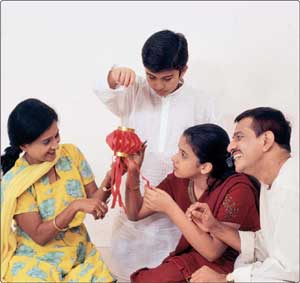 Why Do Good Deeds?
Why Do Good Deeds?
நாம் ஏன் நல்லதைச் (புண்ணியம்) செய்ய வேண்டும்?
Mengapa Harus Melakukan Perbuatan Baik?
Pourquoi devons-nous faire de bonnes actions?§

Everyone in the family helps prepare for the morning puja. The boy is cleaning a brass lamp. The girl is helping her mother make a garland. The worship is more powerful when everyone helps get ready. காலை பூசைக்கு குடும்பத்திலுள்ள ஒவ்வொருவரும் உதவுகிறார். சிறுவன் வெண்கல விளக்கை தூய்மையாக்குகிறான். சிறுமி மாலை கட்ட அம்மாவுக்கு உதவுகிறாள். ஒவ்வொருவரும் பூசையின் ஆயத்தத்திற்கு உதவும்போது வழிபாடு அதிக சக்தி வாய்ந்ததாகிறது. Setiap orang dalam keluarga membantu menyediakan puja pagi. Budak lelaki itu sedang membersihkan lampu. Budak perempuan pula sedang membantu ibunya membuat kalungan bunga. Puja akan lebih berkuasa apabila semua orang membantu untuk bersedia. Chacun aide à préparer la puja du matin. Le garçon nettoie une lampe de cuivre. La fille aide sa mère à confectionner une guirlande. Le rituel sera d’autant plus puissant quand tout le monde y contribue.§

The Tirukural advises, “Be unremitting in the doing of good deeds. Do them with all your might and by every possible means.” Unremitting means to not give up or stop. As Hindus, we do good deeds as often as we can. Good deeds are actions that help other people, like helping mom with dinner or a friend with homework. When we do good deeds, the action itself makes us feel good and strengthens our character. We need no further reward. It doesn’t matter if others notice our service or thank us for it. We take joy in doing it. Some good deeds are religious service. These are called karma yoga, seva or Sivathondu. Examples are helping with the temple chores or making garlands for the Deity. Religious service gives us joy and satisfaction. Those who are generous with their time, do karma yoga and help others are happy people. Those who are selfish with their time and are always too busy to do karma yoga or help others are not so happy. Gurudeva teaches, “If you want to attain happiness, make others happy.” We gain good karma from doing good deeds. We set an example for others to be unselfish and perform good deeds whenever they get the chance. Watch for opportunities to serve each day, at home, in school and elsewhere.§

திருக்குறள் “ஓயாமல் அல்லது இடைவிடாது நற்செயல் (தர்மம்) புரிய வேண்டும். அதையும் இயன்ற வரை செய்யக் கூடிய வகையால் செய்ய வேண்டும் என்று அறிவுறுத்துகிறது. ஓயாமல் என்றால் இடைவிடாது நிறுத்தாமல் என்பது பொருளாகும். இந்துக்களாகிய நாம் முடிந்தளவு நற்செயல்களை அடிக்கடி செய்ய வேண்டும். நற்செயல் எனப்படுவது அம்மாவுக்கு உதவி செய்தல் அல்லது நண்பனுக்கு பள்ளி வீட்டுப் பாடங்களில் உதவுவது போன்றதாகும். நாம் நற்செயல்கள் செய்யும்பொழுது அச்செயல் நம்மை மகிழ்வடையச் செய்கிறது மற்றும் நமது பண்பியல்புகள் வலுவடைகிறது. நமக்கு ஏனைய பிரதி பலன்கள் தேவையில்லை. மற்றவர்கள் நமது சேவையைப் பார்ப்பதையும் நன்றி கூறுவதையும் பொருட்படுத்தக் கூடாது. இதைக் செய்வதன் மூலம் மகிழ்ச்சி கொள்ள வேண்டும். சில நற்சேவைகள் சமயம் சார்ந்தவையாகும். இவற்றைக் கர்மயோகம். சேவை அல்லது சிவதொண்டு என்கிறோம். எடுத்துக் காட்டாக கோயிலில் செய்யும் சேவை அல்லது மூர்த்தங்களுக்கு மாலை கட்டுதல் முதலியன. சமயத் தொண்டுகள் நமக்கு மகிழ்ச்சியும் திருப்தியும் அளிக்கிறது. மற்றவர்களுக்கு உதவவும் நேரத்தைச் செலவிடுபவர்கள் மகிழ்ச்சியான மக்களாவார்கள். கர்மயோகத்துக்கும் மற்றவர்களுக்கு உதவவும் நேரத்தை ஒதுக்காத சுயநலவாதிகள் மகிழ்ச்சியாக இருக்கமாட்டார்கள். குருதேவர் “நீங்கள் மகிழ்ச்சியடைய விரும்பினால் மற்றவர்களை மகிழ்ச்சியடையச் செய்யுங்கள்.” என்று போதிக்கிறார். நற்செயலாற்றுவதன் மூலம் நல்ல கர்மவினைகள் அல்லது புண்ணியம் பெறுகிறோம். நாம் சுயநலம் இல்லாமல் வாய்ப்புக் கிடைக்கும்போதெல்லாம் மற்றவர்களுக்கு நற்செயல் புரிபவர்கள் என்று எடுத்துக் காட்டாகத் திகழவேண்டும். ஒவ்வொரு நாளும் வீட்டிலும் பள்ளியிலும் சேவையாற்ற சந்தர்ப்பத்துக்காக எதிர் பாருங்கள். §

Tirukural menasihati kita, “Janganlah berhenti atau berputus asa berbuat baik. Lakukannya sedaya mungkin dan dengan setiap cara yang mungkin. Sebagai orang Hindu, kita berbuat baik seberapa yang boleh. Perbuatan baik adalah perbuatan yang akan membantu orang lain, seperti membantu ibu menyediakan makan malam atau kawan dengan kerja sekolahnya. Apabila kita melakukan perbuatan baik, tindakan itu sendiri akan membuat kita berasa baik dan menguatkan lagi diri kita. Kita tidak akan memerlukan penghargaan lain. Adalah tidak penting samada orang lain menyedari jasa atau berterima kasih pada kita. Yang pentingnya kita berasa gembira dengan melakukannya. Ada sesetengah perbuatan merupakan khidmat keagamaan. Ia dipanggil karma yoga, seva ataupun Sivathondu. Misalnya, membantu melakukan kerja harian di kuil dan membuat kalungan bunga untuk Tuhan. Khidmat keagamaan memberi kita kegembiraan dan kepuasaan. Mereka yang murah hati dengan masa, berasa bahagia dengan melakukan karma yoga dan membantu orang lain. Sebaliknya mereka yang kedekut dengan masa dan selalu terlalu sibuk untuk melakukan karma yoga atau membantu orang lain adalah mereka yang tidak akan begitu bahagia. Gurudeva mengajar “Sekiranya anda ingin mengecapi kebahagiaan, buatlah orang lain bahagia.” Kita mendapat karma baik dengan melakukan perbuatan baik. Kita menjadi teladan kepada orang lain dengan tidak mementingkan diri sendiri dan melakukan perbuatan baik apabila mendapat peluang. Sentiasa cari peluang untuk berjasa setiap hari di rumah, di sekolah dan di mana-mana.§

Le Tirukural nous donne ce conseil: «Ne renvoie pas les bonnes actions à plus tard. Fais le bien à chaque occasion et par tous les moyen possibles: mets-y toute ton énergie.» N’arrête pas, n’abandonne pas. En tant qu’Hindous, nous faisons autant de bonnes actions que possible, des actions utiles aux autres telles qu'aider notre maman à préparer le dîner ou aider un camarade à faire ses devoirs. Bien agir, cela nous aide à nous sentir bien, et fortifie notre caractère. Nous ne recherchons aucune autre récompense. Peu importe si les autres remarquent notre service où s’ils nous remercient. L’action elle-même nous procure de la joie. Certaines bonnes actions font partie du service religieux: le karma yoga, séva ou sivathondu. On peut aider en acceptant des tâches au temple, ou en confectionnant des guirlandes pour le Dieu. Le service religieux nous apporte joie et satisfaction. Ceux qui donnent généreusement de leur temps, ceux qui font du karma yoga et qui aident les autres sont des gens heureux. Ceux qui sont avares de leur temps et qui sont toujours trop occupés pour faire du karma yoga ou aider les autres ne se sentent pas aussi heureux. Comme l’enseigne Gurudeva, «Si vous voulez le bonheur, rendez les autres heureux.» On crée pour soi du bon karma en faisant de bonnes actions. On montre aux autres par l’exemple comment être désintéressé et faire le bien à chaque occasion. Chaque jour, guette les occasions de servir, à la maison, à l’école, et partout.§
 This girl is helping her mother prepare a meal. A family is a team. We should help around the house without thinking about a reward. இந்தச் சிறுமி உணவு தயாரிக்க அம்மாவுக்கு உதவுகிறாள். ஒரு குடும்பம் ஒரு குழுவாகும். பிரதி பலனை எண்ணாமல் வீட்டில் உதவ வேண்டும். Budak perempuan ini sedang membantu ibunya menyediakan makanan. Keluarga adalah satu kumpulan. Kita harus membantu di rumah tanpa memikir tentang ganjaran. Cette jeune fille aide sa mère à cuisiner. La famille est une équipe. Nous devons aider à la maison sans attendre de récompense.§
This girl is helping her mother prepare a meal. A family is a team. We should help around the house without thinking about a reward. இந்தச் சிறுமி உணவு தயாரிக்க அம்மாவுக்கு உதவுகிறாள். ஒரு குடும்பம் ஒரு குழுவாகும். பிரதி பலனை எண்ணாமல் வீட்டில் உதவ வேண்டும். Budak perempuan ini sedang membantu ibunya menyediakan makanan. Keluarga adalah satu kumpulan. Kita harus membantu di rumah tanpa memikir tentang ganjaran. Cette jeune fille aide sa mère à cuisiner. La famille est une équipe. Nous devons aider à la maison sans attendre de récompense.§
 The whole family helps decorate for a festival. Everyone is admiring the son's decoration. Festivals are special times for togetherness. ஒரு விழாவுக்காக குடும்பமே அலங்காரத்துக்கு உதவுகிறது. ஒவ்வொருவரும் மகனின் அலங்காரத்தைப் பாராட்டுகிறார்கள். அனைவரும் ஒன்று கூடுவதற்கு விழாக்கள் விசேஷ காலமாகும். Semua ahli keluarga sedang menghias untuk suatu perayaan. Semua orang memuji perhiasan yang dibuat oleh anak lelaki itu. Perayaan adalah masa istimewa untuk bersama-sama. Toute la famille participe aux décorations de fête. La décoration du fils est très appréciée. Les fêtes sont une occasion spéciale pour se retrouver.§
The whole family helps decorate for a festival. Everyone is admiring the son's decoration. Festivals are special times for togetherness. ஒரு விழாவுக்காக குடும்பமே அலங்காரத்துக்கு உதவுகிறது. ஒவ்வொருவரும் மகனின் அலங்காரத்தைப் பாராட்டுகிறார்கள். அனைவரும் ஒன்று கூடுவதற்கு விழாக்கள் விசேஷ காலமாகும். Semua ahli keluarga sedang menghias untuk suatu perayaan. Semua orang memuji perhiasan yang dibuat oleh anak lelaki itu. Perayaan adalah masa istimewa untuk bersama-sama. Toute la famille participe aux décorations de fête. La décoration du fils est très appréciée. Les fêtes sont une occasion spéciale pour se retrouver.§